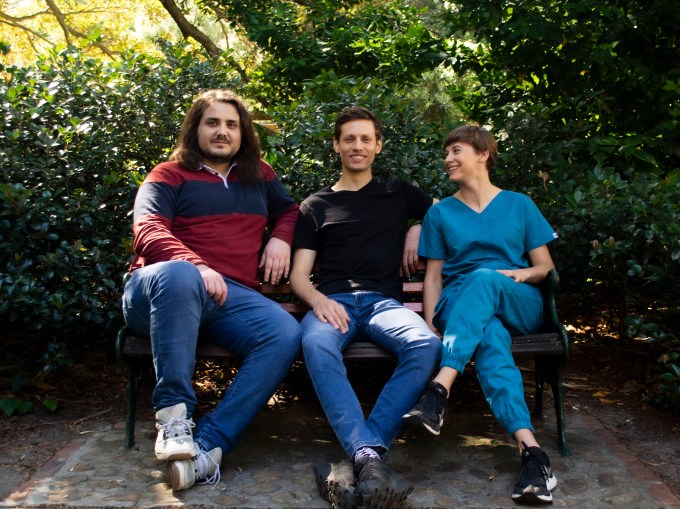Business
HealthLeap raises $1.1M pre-seed to reduce malnutrition in hospitals with clinical AI assistant

Malnutrition is somewhat common among hospitalized patients in the U.S., and its coded prevalence is increasing. Amid this problem lies an opportunity to optimize the overall quality of patient care, improve clinical outcomes and reduce costs.
That’s the drive for South Africa-based health tech startup HealthLeap, which focuses on a global healthcare market starting from the U.S. The startup provides a clinical assistant for dietitians working in hospitals. It’s emerging from stealth to announce its $1.1 million pre-seed round led by deep tech investor Fifty Years.
Malnutrition happens when there’s a deficiency, excess or imbalance of nutrients in people’s bodies. This can cause significant adverse effects on people’s physiology and clinical outcomes.
People with diseases can develop malnutrition when they cannot consume adequate quantities or quality of food, or their diet does not reach the proper levels of nutrients to compensate for the specific nutritional needs created by the disease.
HealthLeap’s method is to use clinical nutrition to diagnose, prevent and manage these nutritional changes in these patients.
The health tech company says it is building AI-assisted tools for healthcare professionals to better address hospital malnutrition.
“As a clinical dietitian, I saw many patients suffer due to malnutrition being insufficiently addressed in hospitals, partially because clinical dietitians are understaffed, and other clinicians are not adequately trained in clinical nutrition,” clinical dietitian and chief research officer Jemima Meyer told TechCrunch.
“I wanted to help dietitians with the complex clinical calculations that they constantly tailor to each patient case and their changing medical condition.”
Meyer hacked the first version of a research-backed productivity tool to help her colleagues perform calculations, make decisions using the latest clinical research and treat more patients in less time.
With her brother and CEO Josiah Meyer and CTO Ray Botha, they standardized the process, and that was how HealthLeap was launched in April 2021.
The company’s AI-based clinical assistant product is called NutriLeap. Its mobile app, which is HIPAA-compliant, helps hospital dietitians (and soon the other healthcare providers they collaborate with) with automated clinical calculations and research-backed suggestions. With this, they can determine precise, personalized nutritional needs significantly faster for patients.
“We are predicting optimal treatment steps to ensure patients receive adequate nutrition,” said CTO Botha. “The decisions clinicians make inside our app combined with data from other sources, including an EHR integration, will further improve our predictions.”
The app is used by 50 dietitians in a private beta program. The company said it has a waitlist nearing 1,000 dietitians, pharmacists and physicians.

HealthLeap founders: Ray Botha, CTO: Josiah Meyer, CEO; Jemima Meyer, CRO
Malnutrition in hospitals is associated with 3-5x mortality during a hospital stay. It affects 30-50% of patients, but only 5% are diagnosed. HealthLeap says it wants to eradicate hospital malnutrition globally. But for now, it is focused on the U.S. because of the possibilities the new United States Core Data for Interoperability (USCDI) standards unlock.
“We believe in a future where nutrition is uniquely optimized for the health of every person. We want to help make nutrition data-driven for everyone, and we’re starting with the people that need it most urgently: hospital patients,” said the chief executive Josiah Meyer. “One important data source that got unlocked is Electronic Health Record data due to the USCDI standards.”
The USCDI standards, approved in July last year, allow health tech organizations to access previously unavailable health data sources. And with the pandemic massively accelerating healthcare professionals’ adoption rates of digital tools, HealthLeap is poised to capture a significant market share with its software.
In addition to helping clinical dietitians and other healthcare providers (hospital pharmacists, physicians, nurses) identify patients at risk of malnutrition, HealthLeap also prescribes daily quantities of oral, tube, and IV feeding to the patient’s ever-changing needs. The company said it treats patients even after discharge.
HealthLeap is still very much in the pre-revenue stage. But it won’t stay that way much longer. According to preliminary pricing research carried out by the company, 97% of its target users are willing to pay a monthly subscription fee out for access to NutriLeap.
Figuring out revenue is good news for startups and the investors backing them. For Fifty Years, HealthLeap’s lead investor that recently raised $90 million for its third and newest fund, investing in “the next generation of founders that will change the world for the better” is paramount as well. That’s why the firm, which is made up of 44 unicorn founders, backed HealthLeap.
“It’s a tragedy that so many die needlessly because they don’t get the nutrition they need while in the hospital,” said Fifty Years founding partner Seth Bannon in a statement. “By addressing hospital malnutrition in a scalable way using machine learning, HealthLeap will save dietitians time, save healthcare providers money, and most importantly save patients’ lives. That’s easy to get excited about.”
HealthLeap says it will use this pre-seed capital to hire software engineers and data scientists to continue creating smart tools to help clinicians prevent and treat hospital malnutrition.
-

 Entertainment6 days ago
Entertainment6 days agoWhat’s new to streaming this week? (Jan. 17, 2025)
-

 Entertainment6 days ago
Entertainment6 days agoExplainer: Age-verification bills for porn and social media
-

 Entertainment5 days ago
Entertainment5 days agoIf TikTok is banned in the U.S., this is what it will look like for everyone else
-

 Entertainment5 days ago
Entertainment5 days ago‘Night Call’ review: A bad day on the job makes for a superb action movie
-

 Entertainment5 days ago
Entertainment5 days agoHow ‘Grand Theft Hamlet’ evolved from lockdown escape to Shakespearean success
-

 Entertainment5 days ago
Entertainment5 days ago‘September 5’ review: a blinkered, noncommittal thriller about an Olympic hostage crisis
-

 Entertainment5 days ago
Entertainment5 days ago‘Back in Action’ review: Cameron Diaz and Jamie Foxx team up for Gen X action-comedy
-

 Entertainment5 days ago
Entertainment5 days ago‘One of Them Days’ review: Keke Palmer and SZA are friendship goals
















